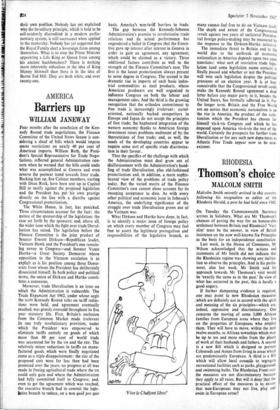Barriers up
AMERICA WILLIAM JANE WAY
Four months after the conclusion of the Ken- nedy Round trade negotiations, the Finance Committee of the United States Senate is con- sidering a sheaf of bills which would impose quota restrictions on nearly 40 per cent of American imports. William Roth, the Presi- dent's Special Representative for Trade Nego- tiations, reflected general Administration con- cern when he warned that the bills could undo what was accomplished at Geneva and even reverse the postwar trend towards freer trade. Backing him up, five Cabinet members, starting with Dean Rusk, have been sent up to Capitol Hill to testify against the proposed legislation and the President has put his own prestige directly on the line with a diatribe against Congressional protectionism.
The White House, in fact, has panicked. Three circumstances account for the fact: the nature of the sponsorship of the legislation; the case set forth by the sponsors; and, above all, the wider issue which the fight over trade liberal- isation has raised. The legislation before the Finance Committee is the joint product of Senator Everett Dirksen—Republican leader, Vietnam Hawk and the President's one remain- ing envoy to Congress—and Senator Vance Hartke—a Great Society Democrat whose opposition to the Vietnam escalation is as explicit as is his position among those Demo- crats from whom the President has deliberately dissociated himself. In both policy and political terms, the union of Dirksen and Hartke consti- tutes a consensus.
Moreover, trade liberalisation is an issue on which the Administration is vulnerable. The Trade Expansion Act 1962, under whose aegis the GATT Kennedy Round talks on tariff reduc- tions were held, and agreement eventually reached, was grossly oversold throughout its five year statutory life. First, Britain's exclusion from the Common Market made irrelevant its one truly revolutionary provision, under which the President was empowered to eliminate tariffs entirely on goods of which more than 80 per cent of world trade was accounted for by the us and the EEC. The relatively minor reductions in tariffs on manu- factured goods which were finally negotiated came as a triple disappointment: the size of the proposed cuts were far less than had been promised over the years; no progress at all was made in freeing agricultural trade where the us could only gain and where the Administration had fully committed itself to Congress; and, even to get the agreement which was reached, the executive branch had to commit the legis- lative branch to reduce, on a non quid pro quo
basis, America's non-tariff barriers to trade.
The gap between the Kennedy-Johnson Administration's promise to revolutionise trade relations and its actual performance has engendered a belief in Congress that the Execu- tive gave up interest after interest in Geneva in order to gain an agreement, any agreement, which could be claimed as a victory. Three additional factors contribute as well to the strength of the Finance Committee's case. The first is the latent protectionism always present to some degree in Congress. The second is the dramatic rise in imports of such basic indus- trial commodities as steel products, whose American producers are well organised to influence Congress on both the labour and management sides. And the third is the growing recognition that the orthodox commitment to free trade is increasingly irrelevant: cartel- oriented, nationally backed competitors in Europe and Japan do not accept the principles of free trade; the haphazard integration of the western economy thanks to American foreign investment raises problems undreamt of by the theoreticians of free trade; and, as well, the needs of the developing countries appear to require some sort of specific trade discrimina- tion in their favour.
Thus the specifics of the challenge with which the Administration must deal grow out of disillusionment with the Administration's hand- ling of trade liberalisation, plus old-fashioned protectionism and, in addition, a more sophis- ticated view of the problems of trade policy today. But the varied merits of the Finance Committee's case cannot alone account for its sweeping acceptance to date. As with every other political and economic issue in Johnson's America, the underlying significance of the struggle over trade liberalisation grows out of the Vietnam war.
What Dirksen and Hartke have done, in fact, is to identify a major issue of foreign policy on which every member of Congress may feel free to assert the legitimate prerogatives and responsibilities of the legislative branch, as
many cannot feel free to do on Vietnam itself. The depth and extent of the Congressional revolt against two years of unilateral Presiden- tial foreign policy-making may be measured by the response to the Dirksen-Hartke initiative.
The immediate threat to Britain and to the world due to the outbreak of economic nationalism in America depends upon two open questions: what sort of restrictive trade legis- lation (and some legislation seems certain) is finally passed and whether or not the President will veto such legislation despite the political pressures of an election year. It is at least conceivable that the Congressional revolt could make the Kennedy Round agreement a dead letter before any major party to it, besides the United States, has formally adhered to it. For the longer term, Britain and the Free World are on notice that economic nationalism is on the rise in America, the product of the isola- tionism which the President has chosen for himself vis-à-vis Congress and which he has imposed upon America vis-à-vis the rest of the world. Certainly the prospects for further trade liberalisation or for any such new departures as Atlantic Free Trade appear now to be non- existent.










































 Previous page
Previous page